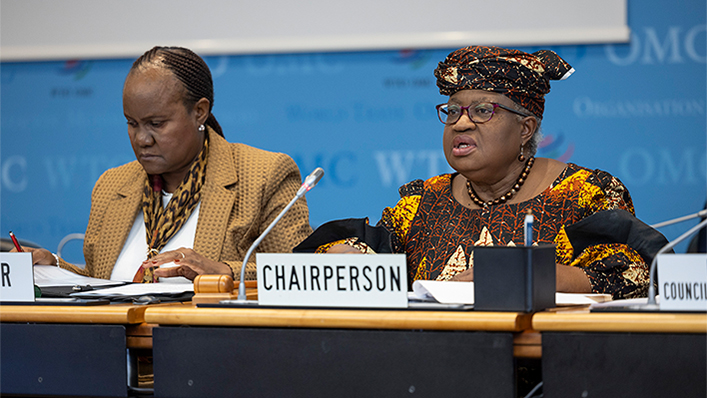
“The world economy is not in good shape,” the Director-General told members in her capacity as TNC Chair. “We know people are bearing the brunt of slow growth, volatile prices, climate impacts and debt pressures. We have a responsibility to contribute to efforts to reinvigorate growth and opportunities for people everywhere.”
For this reason, “we must have a substantive and meaningful Ministerial with concrete results,” she said. “It is welcome that stakeholders increasingly understand that trade is part of the solution for many contemporary global challenges we are facing. But we still have the onus on us here in Geneva to deliver.”
The TNC heard reports from the chairs of the negotiations on agriculture, development and fisheries – Ambassador Alparslan Acarsoy of Türkiye, Ambassador Kadra Hassan of Djibouti and Ambassador Einar Gunnarsson of Iceland, respectively — on the state of play in their discussions.
On agriculture, Ambassador Acarsoy said members now had proposals on almost all negotiating topics on the table as well as on food security in general. The number of submissions “confirms the interest of members in achieving an outcome on agriculture,” he said.
Nevertheless, “there is clearly a lack of convergence in members’ positions on the key negotiating issues,” Ambassador Acarsoy said, adding that for many if not all members, a lack of an outcome in agriculture at MC13 would be a “major setback.” The next round of agriculture negotiations will take place on 16-17 January, he added.
Ambassador Hassan said the importance of special and differential treatment for developing and least developed country members was reaffirmed at MC12 and during a Senior Officials Meeting on 23-24 October. She called on members to “seize the opportunity provided by this much-needed political guidance” to engage in positive and results-oriented discussions in the lead-up to MC13.
Ambassador Gunnarsson said that despite difficult discussions at the start of last week’s “fish week” of negotiations, subsequent brainstorming sessions resulted in a “more positive tone which indicated to me that an outcome on fisheries subsidies by MC13 remains within reach.”
He said he would redouble efforts in the New Year by scheduling an intensive “fish month” of negotiations starting in mid-January.
The Director-General described the chair reports as “sobering, but still hopeful.”
“It is clear from the chairs’ reports that we have the elements we need, but we are at the difficult stage of bridging gaps,” the Director-General said. “While this is normal prior to a Ministerial Conference where we are trying to deliver meaningful outcomes, we need to figure out in the short period left how we can make meaningful progress.”
“Let us recall the words that were said: that we want to de-dramatize the Ministerial Conference,” she added. “If that remains the case, then we must dramatize Geneva. So let’s see how we can heat up the drama here so that we can deliver.”
Ambassador Athaliah Molokomme of Botswana, the Chair of the General Council, delivered a report on the drafting process she has been leading on a possible MC13 outcome document.
She noted that a “skeleton” of a possible outcome document was first circulated to members on 27 November. Part 1 of the text would focus on the broad political messages that ministers would want to put across at MC13 while Part 2 would reference any possible specific decisions/declarations.
Four rounds of consultations have taken place on the text, with a fourth revised text shared with members on 8 December. Ambassador Molokomme expressed hope that this later version would allow members to transition to a paragraph-by-paragraph discussion of a draft text starting in mid-January.
Share
Reach us to explore global export and import deals